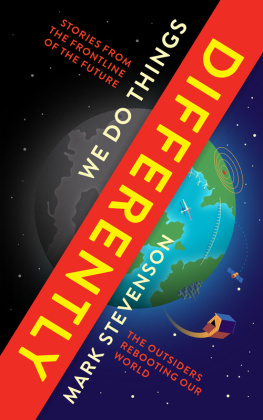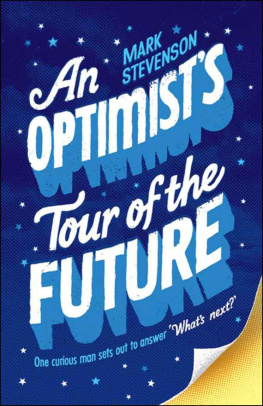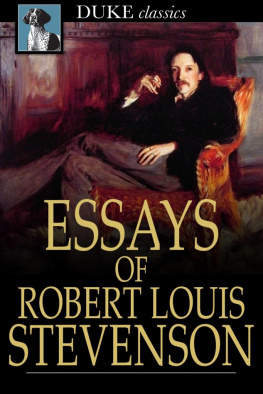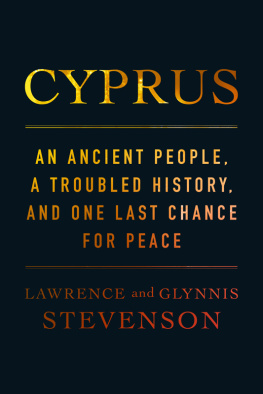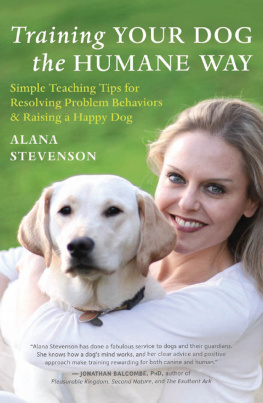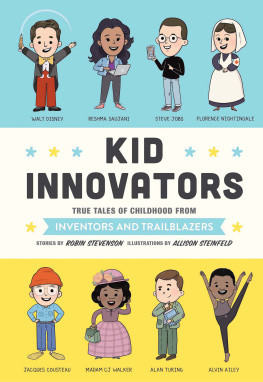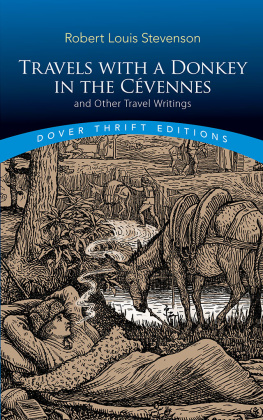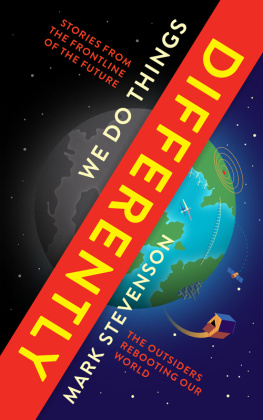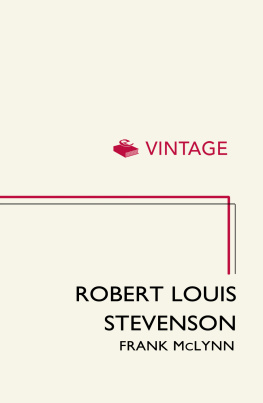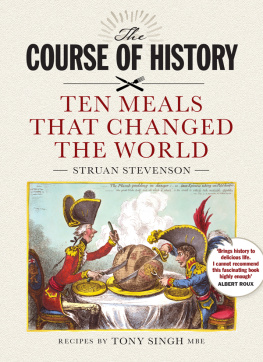
WE DO THINGS DIFFERENTLY
MARK STEVENSON is a writer, entrepreneur, broadcaster, futurologist and founder of The League of Pragmatic Optimists. He has written for Radio 4, the Times, Wall Street Journal, Guardian and New Statesman, and is the author of the critically acclaimed An Optimists Tour of the Future. He lives in London and is an adviser to (among others) The Atlas of the Future, The Virgin Earth Challenge, and Civilised Bank.
PRAISE FOR MARK STEVENSONS
AN OPTIMISTS TOUR OF THE FUTURE
Essential illuminating and refreshingly hopeful an auspicious yet grounded vision Atlantic
A rollicking roller-coaster ride around the cutting edge of science with dozens of laugh-out-loud moments. Scotsman
Infectiously enthusiastic. Sunday Times
Makes a good case for believing that we can have a future worth making an effort to reach. Guardian
Sharp and fascinating. Wall Street Journal
Out there on the edge of research, Stevenson puts the trends of tomorrows world into perspective with a quizzical, fast-paced, quick-witted tour of the scientific horizon. The Times
An ability to express even the most complex scientific problems in terms easily understood by a layperson. Sydney Morning Herald
A refreshing reminder that the future will always belong to the optimists. New Scientist
It may just be our generations version of Bill Brysons Short History of Nearly Everything a bold and entertaining blueprint for a future thats ours to shape and ours to live. Brainpickings
This is an absolute winner: entertaining, educational, jaw-dropping. Never before have I been so captivated by a piece of non-fiction. Bookbag
WE DO THINGS DIFFERENTLY
THE OUTSIDERS REBOOTING OUR WORLD
MARK STEVENSON

First published in Great Britain in 2017 by
Profile Books:
3 Holford Yard, Bevin Way
London WC1X 9HD
www.profilebooks.com
Copyright Mark Stevenson 2017
1 3 5 7 9 10 8 6 4 2
The moral right of the author has been asserted.
All rights reserved. Without limiting the rights under copyright reserved above, no part of this publication may be reproduced, stored or introduced into a retrieval system, or transmitted, in any form or by any means (electronic, mechanical, photocopying, recording or otherwise), without the prior written permission of both the copyright owner and the publisher of this book.
A CIP catalogue record for this book is available from the British Library.
320pp
e-ISBN 978-1782830863
For Caroline and Emmett, who help me think differently
The future belongs to those who believe in the beauty of their dreams.
Eleanor Roosevelt
Theres a way to do it better. Find it.
Thomas Edison
INTRODUCTION
WINDMILLS
Never interrupt someone doing what you said couldnt be done. AMELIA EARHART, AVIATOR
There is a man in the sleepy market town of Bishops Stortford, Hertfordshire who has found a solution to two of humanitys biggest challenges using only his lawnmower and a can of antifreeze. In Boston an engineer with no medical training has given the healthcare profession access to something more powerful than any drug ever created. Just outside the city of Ranchi, north-east India, a young man is growing crops in places that accepted wisdom would suggest that its hopeless to farm, while in Brazil an idea first proposed by some neighbourhood activists is achieving something many would consider impossible it makes politicians popular.
There have always been a subset of people who think differently. A smaller number do differently, people who look at the status quo and not only think I could fix that but actually roll their sleeves up and start working.
And never have we needed them more.
We live in the eye of a storm, a time in history where human-kind must change the way it organises itself or face disastrous consequences. Our energy and food systems are increasingly unsustainable, promising an entwined environmental, economic and humanitarian crisis of unprecedented proportions. Democracy, where it exists, is descending into alienating tribalism. Inequality is rife. If youre lucky enough to enjoy a free press, its likely you dont trust it. The worlds healthcare systems are, in reality, astonishingly expensive and labyrinthine sick-care systems. And in most parts of the developed world, our education systems still seem trapped in the last century.
Its easy to feel despondent. But for some individuals, the roll call of bad news (not helped by the fact that as far as the media is concerned the bad news is pretty much the only news) isnt a cause for despair, but a call to arms. I know because I spend my life hunting them out and trying to learn their lessons. When it comes to the future they are here to remind us that there are many more options available than the leaders of any corporation, political party, pressure group, religion, academic institution or media outlet would have you believe.
Such pioneers have never had it easy. In 1532 the maestro of change and original political scientist Niccol Machiavellis famous political treatise The Prince was published. In it he wrote:
It ought to be remembered that there is nothing more difficult to take in hand, more perilous to conduct, or more uncertain in its success, than to take the lead in the introduction of a new order of things. Because the innovator has for enemies all those who have done well under the old conditions, and lukewarm defenders in those who may do well under the new. This coolness arises partly from fear of the opponents, who have the laws on their side, and partly from the incredulity of men, who do not readily believe in new things until they have had a long experience of them.
In short, change might sound possible in principle but well only believe it if we can see it.
Welcome, then, to We Do Things Differently a follow-up, or more exactly a prequel, to my previous book, An Optimists Tour of the Future. For this is not so much a book about the future as about the here and now. It charts a journey to find the people who, despite the resistance of those who benefit from the status quo, are putting brave and alternative futures on the table new ways of organising ourselves that address the grand challenges of our age. It features innovators reshaping the education system, exploring new forms of government, reforming the world of health care and medicine, re-booting cities and changing the way we think about and produce our food and energy.
These innovators are not tinkering with the existing system, but looking to change the system itself.
Of course the world is replete with armchair sages telling us what they think the future should be like and how much better it would be if we agreed with them. So, I had one overriding criterion for inclusion in my itinerary. The innovators had to be succeeding right now in the real world. Whatever their idea, I wanted to be able to touch it, meet the people making and benefiting from it, see the steel in the ground as the saying goes. It had to be working and I had to be able to see it working.
I travelled from the urban devastation of Detroit to a small town on the Austrian-Hungarian border; from the leading genetics labs in the world to one of the toughest housing estates in Britain. I met brilliant people from all walks of life, from poor farmers to hipster software geeks, from some of the worlds highest-ranking scientists to a lone unqualified genius in a shed, from a nightclub owner turned headteacher to an international basketball ace turned engineer. Its a cast of characters who are by turns inspiring, demanding and driven the pioneers, architects and builders of a surprising and hopeful future albeit one that is presently below the radar. People who really do do things differently and invite us to do the same.
Next page
